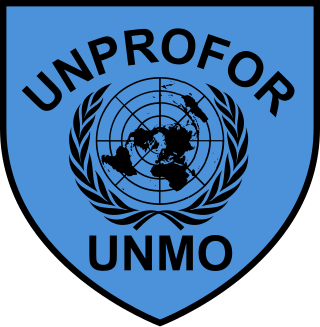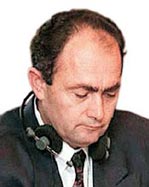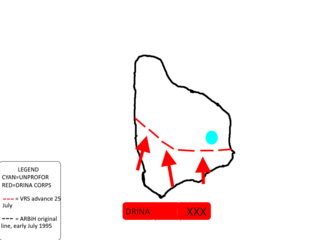
Srebrenica is a town and municipality in Republika Srpska, Bosnia and Herzegovina. It is a small mountain town, with its main industry being salt mining and a nearby spa.
The Army of Republika Srpska, commonly referred to in English as the Bosnian Serb Army, was the military of Republika Srpska, the self-proclaimed Serb secessionist republic, a territory within the newly independent Bosnia and Herzegovina, which it defied and fought against. Active during the Bosnian War from 1992 to 1995, it continued to exist as the armed forces of RS, one of two entities making up Bosnia and Herzegovina, until 2006 when it was integrated into the Armed Forces of Bosnia and Herzegovina. Forces of the VRS engaged in several campaigns, including Operation Corridor 92, Operation Vrbas '92, Operation Bura, and Operation Spider; they were also involved in the siege of Sarajevo, as well as the Srebrenica massacre.

The Srebrenica massacre, also known as the Srebrenica genocide, was the July 1995 genocidal massacre of more than 8,000 Bosniak Muslim men and boys in and around the town of Srebrenica, during the Bosnian War. The killings were perpetrated by units of the Bosnian Serb Army of Republika Srpska (VRS) under Ratko Mladić. The Scorpions, a paramilitary unit from Serbia, who had been part of the Serbian Interior Ministry until 1991, participated in the massacre.

The United Nations Protection Force was the first United Nations peacekeeping force in Croatia and in Bosnia and Herzegovina during the Yugoslav Wars. The force was formed in February 1992 and its mandate ended in March 1995, with the peacekeeping mission restructuring into three other forces.

The Bosnian genocide refers to both the Srebrenica massacre and the wider crimes against humanity and ethnic cleansing campaign throughout areas controlled by the Army of Republika Srpska (VRS) during the Bosnian War of 1992–1995. The events in Srebrenica in 1995 included the killing of more than 8000 Bosniak men and boys, as well as the mass expulsion of another 25000–30000 Bosniak civilians by VRS units under the command of General Ratko Mladić.

The Republika Srpska was a self-proclaimed statelet in Southeastern Europe under the control of the Army of Republika Srpska during the Bosnian War. It claimed to be a sovereign state, though this claim was only partially recognized by the Bosnian government in the Geneva agreement, the United Nations, and FR Yugoslavia. For the first six months of its existence, it was known as the Serbian Republic of Bosnia and Herzegovina.

Zdravko Tolimir was a Bosnian Serb military commander and war criminal, convicted of genocide, conspiracy to commit genocide, extermination, murder, persecution on ethnic grounds and forced transfer. Tolimir was a commander of the Army of Republika Srpska during the Bosnian War. He was Assistant Commander of Intelligence and Security for the Bosnian Serb army and reported directly to the commander, General Ratko Mladić.

Aslı Bayram is a German actress, writer and beauty pageant titleholder. She is of Turkish descent. Since 2010, she is an Ambassador for Crime Prevention by the Justice Ministry Hessen.

Radovan Karadžić is a Bosnian Serb politician who was convicted of genocide, crimes against humanity and war crimes by the International Criminal Tribunal for the former Yugoslavia (ICTY). He was the president of Republika Srpska during the Bosnian War.

The siege of Srebrenica was a three-year siege of the town of Srebrenica in eastern Bosnia and Herzegovina which lasted from April 1992 to July 1995 during the Bosnian War. Initially assaulted by the Yugoslav People's Army (JNA) and the Serbian Volunteer Guard (SDG), the town was encircled by the Army of Republika Srpska (VRS) in May 1992, starting a brutal siege which was to last for the majority of the Bosnian War. In June 1995, the commander of the Army of the Republic of Bosnia and Herzegovina (ARBiH) in the enclave, Naser Orić, left Srebrenica and fled to the town of Tuzla. He was subsequently replaced by his deputy, Major Ramiz Bećirović.

Ratko Mladić is a Bosnian Serb former military officer and convicted war criminal who led the Army of Republika Srpska (VRS) during the Yugoslav Wars. In 2017, he was found guilty of committing war crimes, crimes against humanity, and genocide by the International Criminal Tribunal for the former Yugoslavia (ICTY). He is serving a life sentence for these crimes in The Hague.

Report about Case Srebrenica (the first part) was a controversial official report on the July 1995 Srebrenica massacre in eastern Bosnia and Herzegovina. It was prepared by Darko Trifunović and published by the Republika Srpska Government Bureau for Relations with the International Criminal Tribunal for the Former Yugoslavia (ICTY).
Hasan Nuhanović is a Bosnian survivor of the Srebrenica genocide who campaigns "For truth and justice" on behalf of other survivors and relatives of the victims. Hasan, the former U.N. interpreter for Dutch peacekeepers who were stationed in Srebrenica in 1995, at the end of the Bosnian war, has been battling the Dutch state in civil court for nine years. Finally, in July 2011, he won on appeal against the Dutch Government with court stating the Dutchbat are to blame for handing over his family members to forces of Ratko Mladić, who was tried in The Hague. His entire immediate family: mother, father and brother, were murdered by the Bosnian Serb Army and its allies from Serbia proper, when they were handed over to them by Dutch U.N. soldiers after seeking refuge in the UN protection force base at Potočari following the fall of the town of Srebrenica in July 1995. Bosnian investigative journalist Dragan Stanimirović nicknamed him the “Elie Wiesel of Bosnia", in a reference to another activist survivor of genocide. His story, Zbijeg, was published in Bosnian in 2012 and in English as The Last Refuge: A True Story of War, Survival and Life Under Siege in Srebrenica in 2019.

United Nations Security Council resolution 1034, adopted unanimously on 21 December 1995, after recalling previous resolutions including Resolution 1019 (1995), the Council discussed violations of international humanitarian law in the former Yugoslavia, specifically in Bosnia and Herzegovina.
The Prosecutor v. Ratko Mladić was a war crimes trial before the International Criminal Tribunal for the former Yugoslavia (ICTY) in The Hague, Netherlands, concerning crimes committed during the Bosnian War by Ratko Mladić in his role as a general in the Yugoslav People's Army and the Chief of Staff of the Army of Republika Srpska.
Events in the year 2017 in Bosnia and Herzegovina.

Bosnian genocide denial is the act of denying the occurrence of the systematic Bosnian genocide against the Bosniak Muslim population of Bosnia and Herzegovina, or asserting it did not occur in the manner or to the extent that has been established by the International Criminal Tribunal for the former Yugoslavia (ICTY) and the International Court of Justice (ICJ) through proceedings and judgments, and described by comprehensive scholarship.
Hatidža Mehmedović was a Bosnian human rights activist, survivor of the Srebrenica massacre, and founder of the Mothers of Srebrenica, an association of women whose relatives were killed in the July 1995 massacre in Srebrenica. Following the massacre of more than 8,000 Muslim Bosniak men and boys, including her husband and two sons, Mehmedović became a vocal advocate for bringing the perpetrators of the Srebrenica massacre to justice.

The siege of Žepa was a three-year long siege of the small Bosnian town of Žepa which had lasted from the summer of 1992 – July 1995 during the Bosnian War. It was initially besieged by the Yugoslav People's Army (JNA) until it switched to the VRS. Throughout the siege, Žepa was part of the Srebrenica–Žepa link in eastern Bosnia. From April 1992 – February 1993, the ARBiH and the civilians of Žepa successfully resisted the Bosnian Serb army due to applying to guerrilla warfare.














